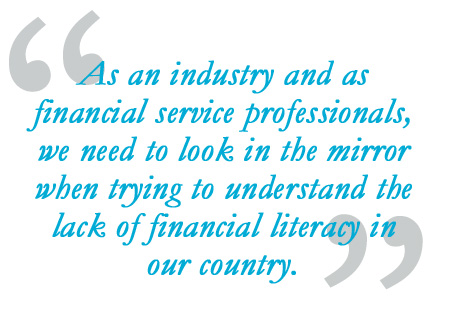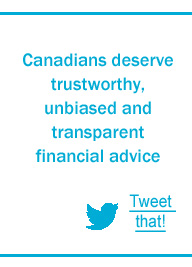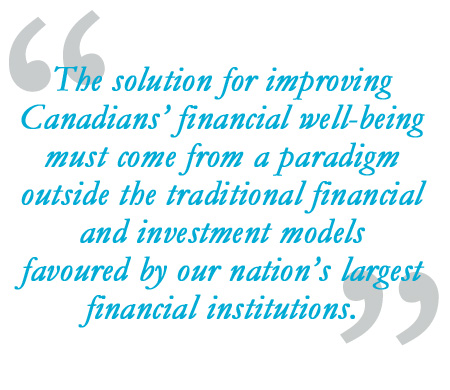By Sheila Walkington, co-founder and CFO Money Coaches Canada

Every year, our nation dedicates an entire month to improving the financial literacy of Canadians, but we don’t seem to be making much progress. According to statistics provided by the Financial Consumer Agency of Canada:
- Less than half (46%) of Canadians have a budget
- Only 8% of Canadians know that they can obtain a credit report for free by mail
- 42% of 35 to 44-year old’s either struggle to or are not keeping up with bills and financial obligations
- 51% of Canadians incorrectly believe that you won’t pay interest on a cash advance if you pay your credit card balance in full by the due date
- 52% of Canadians believe that their household could not cover at least six months’ worth of living expenses if they lost their main source of income
To date, the main strategy to improve Canadian’s financial literacy has been almost entirely based on increasing an individual’s knowledge. But knowledge by itself is not enough!
Information Overload
Canadians, like many in the Western world, live hectic lives. They worry that they don’t have the time necessary to successfully navigate the financial complexities of modern life on their own. They are anxious about their finances. Seven out of 10 Canadians say they worry a lot about their financial situation and nearly 80% don’t have confidence that they’ll achieve their financial life goals.
In response to Canadians being both busy and anxious, our nation’s response to financial literacy is to ask them to learn and do more. In addition to everything else they deal with daily, we expect Canadians to be experts in a wide range of financial areas: banking, budgeting, money management, credit and debt management, financial planning, insurance, fraud, mortgages and loans, retirements and pensions, savings and investing, and taxes.
Knowledge is important, no one is going to suggest otherwise. But we trust experts to guide us through a wide range of areas in our lives (legal, emotional, health, etc.), why should something as important as our financial well-being, something that affects nearly every facet of our daily lives, be any different?
It’s a Matter of Trust
As an industry and as financial service professionals, we need to look in the mirror when trying to understand the lack of financial literacy in our country. Canadians may lose confidence in their doctor or lawyer, but in general they have confidence in the profession to do their job and represent their best interests. Unfortunately, the same cannot be said  about financial services.
about financial services.
This lack of trust was evident in a 2013 survey. According to the CFA Institute & Edelman Investor Trust Study of more than 2,100 retail and institutional investors in Canada, the U.S., Britain, Hong Kong and Australia, financial services sits at the bottom of industries most trusted among clients. When investors were asked which industries they trust to do what is right, only 52 per cent of investors stated they trust the financial services industry.
Fortunately, Canadian regulators took notice of those stats and have begun to focus on investment managers and the need for investors to understand the total costs involved in investing and to have clarity on what they will receive in return. The lack of transparency around investment fees is a big issue that is slowly being addressed through new rules and regulations. The traditional business models that have long benefited the financial services industry at the expense of its clients are being challenged. You can read more about fees and transparency in this conversation between Money Coaches Canada Co-founder Karin Mizgala and Money Coach Noel D’Souza.
A New Approach is Necessary
 The best way to improve the financial literacy of Canadians is to offer them a service they can trust from an advisor that provides unbiased, transparent financial advice:
The best way to improve the financial literacy of Canadians is to offer them a service they can trust from an advisor that provides unbiased, transparent financial advice:
- Advice from professionally educated individuals that spend the time necessary to fully understand the client, and where they stand with money – emotionally and financially
- Advice that is fairly priced, and what clients are paying for is clearly stated
- Advice from advisors whose sole interest is the financial success of their clients, with no hidden agenda or conflicts of interest
True financial wellness comes from developing concise and attainable goals, getting organized and implementing a manageable plan to move forward, measuring progress, and staying committed.
The Money Coaches Canada Way
We believe, absolutely, that Canadian’s need to learn more about their finances and financial services in general, but the goal should not be to teach them to be experts in every facet of personal finance – that’s just not realistic in a fast-paced, busy world.
The best way to improve the financial literacy of Canadians, and improve their financial well-being, is to create a strong environment of trust between client and advisor. Unfortunately, the system serving the clear majority of Canadians today benefits those that provide financial services at the expense of their clients.
 The solution for improving Canadians’ financial well-being must come from a paradigm outside the traditional financial and investment models favoured by our nation’s largest financial institutions. Significantly improving the financial health of Canadians can only begin in earnest when we have a system that delivers unbiased, transparent financial advice. Canadians deserve a new model that delivers financial information and advice that is not tied, in any way, to the selling of financial products.
The solution for improving Canadians’ financial well-being must come from a paradigm outside the traditional financial and investment models favoured by our nation’s largest financial institutions. Significantly improving the financial health of Canadians can only begin in earnest when we have a system that delivers unbiased, transparent financial advice. Canadians deserve a new model that delivers financial information and advice that is not tied, in any way, to the selling of financial products.
Asking Canadians to become experts in personal finance is unrealistic; asking them to take advice from a commissioned-based advisor weakens trust in our industry. We believe Canadians are best served by having a true financial partner. Unfortunately, the odds are very much stacked against Canadian consumers of financial advice. Today, there are approximately 100,000 advisors that are paid through hidden, or poorly communicated investment management fees and only 150 to 200 advisors that embrace the more transparent, fee-for-service model.
The fee-for-service model ensures that there are no conflicts of interest between what’s best for the client and how much an advisor is paid. While there is some resistance to paying directly for financial advice, more and more clients are beginning to understand that a thorough, unbiased review of their finances by a professional they trust is a great investment. However, some consumers simply do not have the resources required to pay directly for financial advice. Highly-personalized financial planning can be out of reach for many of those that need the service most. We recognize this challenge and continue to explore new, innovative delivery methods that will provide a basic level of support at a lower cost while still avoiding the conflicts associated with selling financial products or insurance.
As a nation, and as an industry, we have a long way to go to properly serve the financial needs of Canadians. A month dedicated to financial literacy is a good start, but asking Canadians to learn to manage every facet of their financial well-being won’t get us to where we need to go. We need a system that restores the trust between the consumers and providers of financial services. We need greater transparency on how financial professionals are compensated, and we need alternatives to those services offered by Canada’s dominant financial institutions. At Money Coaches Canada, the success we’ve enjoyed over the past five years confirms our belief that a fee-for-service model like ours is part of the solution.


